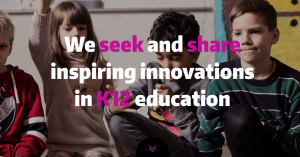We need a genuine global marketplace to share innovations in education
“Great innovations are happening all over the world and the best ones, once validated, could spread fast if we are open to them”
Innovations in education are taking root all over the world – but they don’t always spread, because the education sector remains stubbornly local, argues Saku Tuominen, Creative Director of HundrED, a project to share innovative projects and best practises in K-12 education with the world for free.
The world is global. The world of education is not.
If we agree that the purpose of school is to help kids flourish in life, no matter what happens – or don’t totally disagree with it – we can easily see that there are massive challenges facing our current education system. Possibly the biggest of them all is the increasing amount of uncertainty.
When two massive megatrends – digitalization and globalization – happen simultaneously anything can happen, making the future precariously uncertain. Whole industries can disappear as if overnight and new ones can be born just as fast. As a result, lifelong learning skills aren’t just a ‘nice thing to have’, but a necessary requirement to thrive in this kind of landscape. Not only that, but skills in global communication, digital technologies, creativity and resilience are all required to adapt to the ever-changing professional landscape.
This is not news in the educational world and it is hard to find an expert in education who does not agree with this. Which is why the question isn’t to do with what skills are needed, but how do we make this change happen? How can we adapt our schools to keep up with the changes happening in the world without messing up the system?
Education experts all over the world are great at talking about the need for curiosity, global co-operation and lifelong learning, but the problem lies in actively putting into place these skills in education. When you look at how other industries have kept up with the globalization and digitalization of the world, you notice how the change rarely happens top–down. Change has come instead from innovations that have crossed borders and grown simply because people all over the world have found them useful.
“Education experts are great at talking about the need for curiosity, global co-operation and lifelong learning, but the problem lies in actively putting into place these skills in education”
The world of education is an exception to this.
Despite the fact that we live in an increasingly globalized world and a big part of the skills we need in tomorrow’s world are so called ‘global skills’, education remains extremely local.
Many people in the education world say that you cannot compare education to any other industry, because every country and every educational system is so different. But is this really the case?
It is definitely true that there are many differences between systems and countries at the moment, but when you speak with people who are working on the frontline of education (such as teachers) you come to realise there are also a huge number of similarities. What if the bigger problem is that their voices are not being heard?
Instead of an active and curious global co-operation, education is still happening in local silos. Every country is a silo, every state is a silo, every city is a silo, every school is a silo. There are gatekeepers everywhere, probably more than in any other industry. And when you ask about new innovations from the gatekeepers controlling the education system, it is highly likely that they will say that ‘this would never work in our country’ – even though teachers would actually love it.
It is true that education is a fragile ecosystem and we have to be clever when developing it, but at the same time it is way too valuable to be left without the energizing effect that a healthy competition between great innovations can have on a global scale. Great innovations are happening all over the world and the best ones, once validated, could spread fast if we are open to them and enable them to do so. If we do not allow or enable this to happen we will be left with a system, or a variety of isolated systems, that are not serving their core purpose in a fast changing world.
to slightly misquote William Gibson, “The future of education is already here — it’s just not very evenly distributed”
Instead of building walls between countries, we have to start trusting people who know what works and what doesn’t work, and they are the people who are in the classrooms daily – our teachers. We need to create a genuine global marketplace for ideas and innovations to be shared.
This is what we are trying to do at HundrED.

Instead of pushing new, untested ideas into schools, we concentrate on the ideas that are already out there and seem to be working. In short – we identify great innovations in K12 education and then we evaluate, package and share them. We have selected 100 innovations in Finland that are changing the way children and young people are educated, and are in the process of selecting 100 great innovations globally.
These 100 innovative case studies will then be shared with anyone who is interested in the future of teaching.
The good news is, to slightly misquote William Gibson, “The future of education is already here — it’s just not very evenly distributed.” We need to let these brilliant innovations spread across our borders. We have to create an ecosystem and network of forerunner teachers, and create a model and market where great ideas can travel freely from country to country.
Yes that might mean bypassing some of the gatekeepers of education, which might sound scary, but the alternative is even scarier.
Leave a Reply